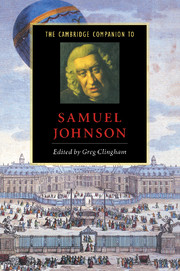Book contents
- Frontmatter
- Introduction
- 1 Extraordinarily ordinary
- 2 Johnson and the arts of conversation
- 3 Johnson's poetry
- 4 Johnson, the essay, and The Rambler
- 5 Johnson and the condition of women
- 6 Johnson's Dictionary
- 7 Johnson's politics
- 8 Johnson and imperialism
- 9 The skepticism of Johnson's Rasselas
- 10 Shakespeare
- 11 Life and literature in Johnson's Lives of the Poets
- 12 Johnson's Christian thought
- 13 “From China to Peru”
- 14 “Letters about nothing”
- 15 Johnson's critical reception
- Further reading
- Index
12 - Johnson's Christian thought
Published online by Cambridge University Press: 28 May 2006
- Frontmatter
- Introduction
- 1 Extraordinarily ordinary
- 2 Johnson and the arts of conversation
- 3 Johnson's poetry
- 4 Johnson, the essay, and The Rambler
- 5 Johnson and the condition of women
- 6 Johnson's Dictionary
- 7 Johnson's politics
- 8 Johnson and imperialism
- 9 The skepticism of Johnson's Rasselas
- 10 Shakespeare
- 11 Life and literature in Johnson's Lives of the Poets
- 12 Johnson's Christian thought
- 13 “From China to Peru”
- 14 “Letters about nothing”
- 15 Johnson's critical reception
- Further reading
- Index
Summary
It is impossible adequately to understand or appreciate Johnson the author without seriously considering Johnson the Christian believer and theological thinker. From the time Johnson first read William Law's Serious Call at the age of twenty, Boswell tells us, “religion was the predominant object of his thoughts” (Life, i, 69-70). Another early biographer, Sir John Hawkins, examined the plan of study Johnson composed at Pembroke College, Oxford, and concluded: “his favourite subjects were classical literature, ethics, and theology” (Hawkins, p. 11). Johnson's first book, a translation of a French edition of the Portuguese Jesuit Jerome Lobo's A Voyage to Abyssinia (1735), reveals his willingness to engage with the theological and religious debates of the seventeenth century.
A further sign of Johnson's early theological inclination is the fact that the second project he ever proposed to Edward Cave, editor of the Gentleman's Magazine, was a new translation of a long, complex, and heavily annotated theological work: Paolo Sarpi's History of the Council of Trent (Letters, 1, 12—13). This work immersed him in the most contentious theological issues of the Reformation and Counter-Reformation: sacramental theology, ecclesiastical polity, apostolic succession, and justification by faith alone. Because of competition from another translator, Johnson eventually abandoned the project in April 1739, though not until he had already produced between 400 and 800 quarto pages of translation and commentary over the course of nine months.
- Type
- Chapter
- Information
- The Cambridge Companion to Samuel Johnson , pp. 192 - 208Publisher: Cambridge University PressPrint publication year: 1997
- 4
- Cited by



